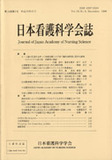Japanese
English
- 販売していません
- Abstract 文献概要
- 参考文献 Reference
要約
気管内挿管中に発生する肺感染症は,上気道分泌物が気管内チューブのカフを介して下気道への吸引をおもな原因としている.その予防に間欠的上気道洗浄(上気道洗浄)は有効な方法である.だが,上気道洗浄する上気道の知覚は,迷走神経(上喉頭神経)と舌咽神経に支配されているため,上気道洗浄による刺激によって循環系への影響が大きいことが考えられる.したがって,上気道洗浄が安全な看護技術であるかどうかを確認するため,上気道洗浄による循環系への影響を検証する研究を試みた.
意識障害の患者群は,上気道洗浄20秒後よりRPP値が増加した.さらに,意識清明で塩酸ドーパミン多量使用の患者群は,5日間に20回上気道洗浄を実施すると,RPP値増加が抑制されていった.これらの結果より上気道洗浄は意識障害の有る患者へは洗浄直後より循環系へ注意する必要があり,意識清明な患者は頻回の吸引刺激によって気道粘膜の閾値が上昇したことにより循環系への影響が減少することが示唆された.
Abstract
Silent aspiration causes nosocomical pneumonia in patients with endotracheal intubation. We propose that intermittent irrigation of the upper respiratory tract (IU) could prevent silent aspiration induced nosocomical pneumonia during endotracheal intubation and intend to practice IU in intensive care units. Upper respiratory tract sensation is controlled by the vagus and glossopharyngeal nerves (N. laryngeus superior). It is thought that IU causes changes in the circulation system and we investigated these changes. We found that the rate pressure product (RPP) value significantly increased after 20 seconds in unconscious patients and suppressed in conscius patients. We suggest that IU causes an early alteration to the circulation system and that this results in a long time (5 days) suction stimulation.
Copyright © 1998, Japan Academy of Nursing Science. All rights reserved.


